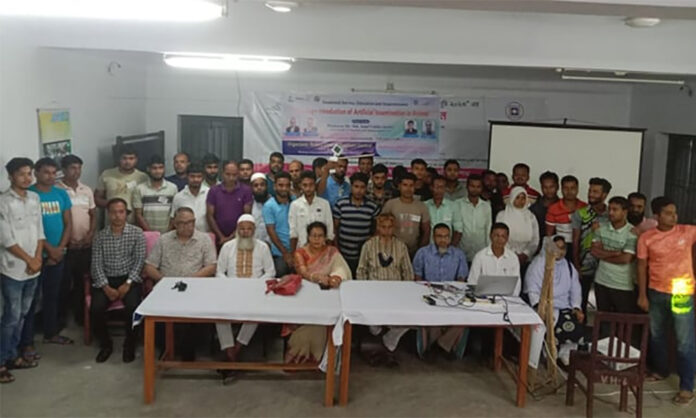
All field level officials, employees and volunteers concerned should discharge their duties with utmost sincerity and honesty to reach artificial insemination services to farmers doorsteps for improving cattle varieties and to fulfill the region’s gradually mounting demands for protein.
Large-scale promotion of the livestock sector is very important to remove the existing protein deficiency alongside ensuring food security. So, utmost emphasis should be given on promoting the artificial insemination in cattle after the best uses of modern technologies.
Academics and researchers came up with the observation while addressing different technical sessions of daylong training titled “Vocational Service, Education and Empowerment: Artificial Insemination in Animals” here on Thursday.
BRAC, Bangladesh Livestock Society (BLS) and Rajshahi University (RU) jointly
organised the training for the artificial insemination service providers at RU Narkelbaria campus.
Dean of RU’s Veterinary and Animal Science Faculty and BLS President Professor Jalal Uddin Sarder addressed the training as the chief guest, while BLS General Secretary Dr Hemayetul Islam was in the chair.
Prof Laila Arjuman Banu from the Department of Chemistry, Deputy Director of District Artificial Insemination Centre Dr Anwarul Haque, BRAC Veterinarian Dr Helal Uddin Mondal also spoke disseminating their expertise on the issue.
Prof Jalal Sarder said the region has an enormous prospect of expanding the livestock sector through best uses of its existing natural resources.
Highlighting the importance of the artificial insemination programme he said the cross-breed calves are comparatively more superior to the local ones so they need special care and improved management for the survival.
The unemployment problem in the region, especially in its rural areas, could be reduced to a greater extent through technology transfer and making dairy farming popular at the grassroots level.
Importance should be given on preserving high quality semen in laboratories from cattle after importing the specimens. “If the high-breed cow can gives 50-litre milk per day, why not the others,” he added.
Modern technology helps increase milk production by one litre from every cowon an average for the last couple of years.
He, however, said artificial insemination has a vital role to play in expansion of cattle breeding and the efforts should be expanded successfully through bringing all the villages under the coverage.
Prof Laila Arjuman Banu stressed the need for more intensive research on the genetic factors of domestic animals for generating more high-milking cows.
She hoped that the training will contribute a lot towards expanding the artificial breeding technology to the target group of people.
Prof Banu urged the participants to apply the new ideas acquired from the course so that the livestock farmers can derive total benefits of the programme.
In his remarks, Dr Anwarul Haque said the artificial insemination is now being judged as proven technology and the genetic development of the livestock animal could be ensured through adequate promotion of the technology.
He said production of both milk and meat would be enhanced when the technology could be reached towards the doorsteps of the grassroots farmers successfully.






